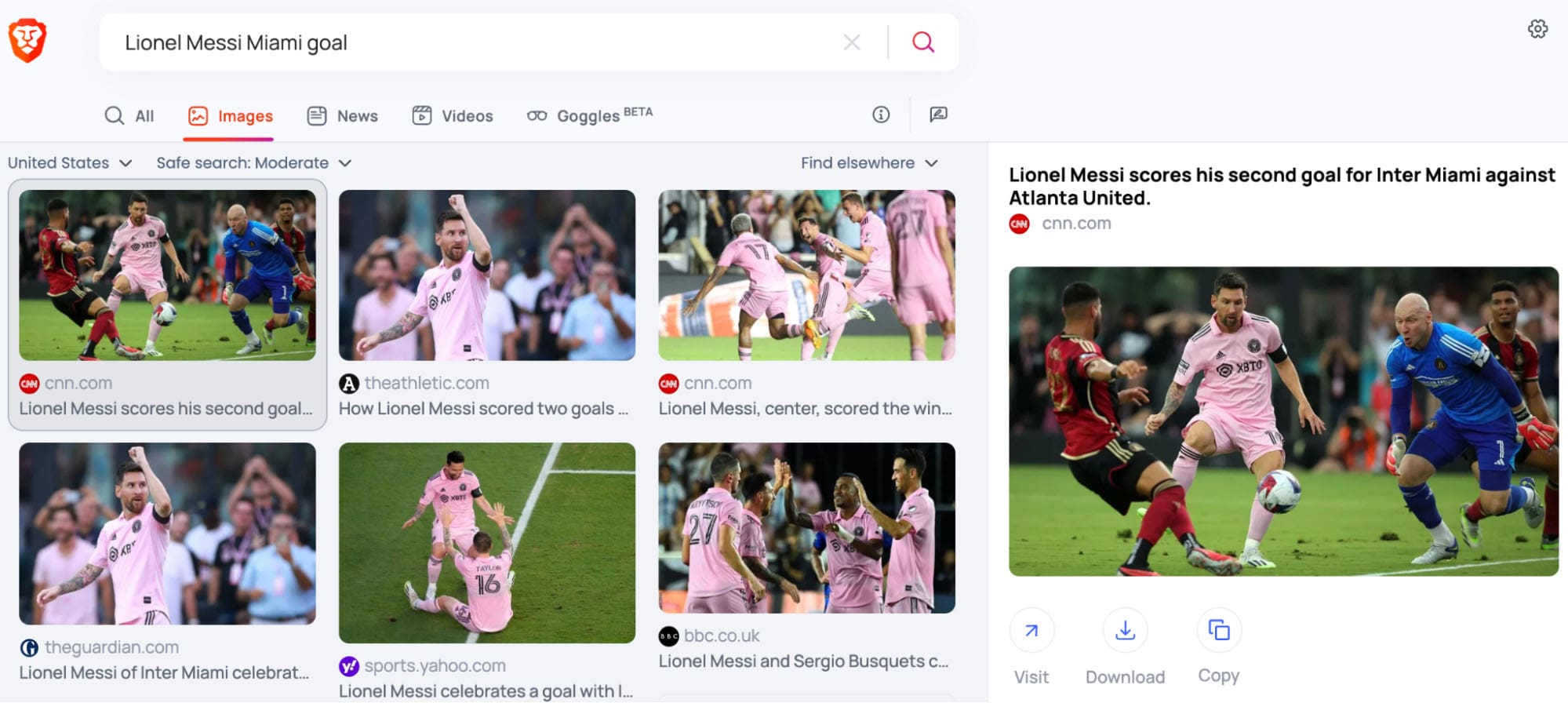Brave Search launches independent image/video search
Summary
Every image and video result in Brave Search is now served by Brave. Users no longer need to choose between Bing and Google for image and video search.
Introduction
After several months of development, Brave Search is releasing its own privacy-preserving image and video search that is independent from Big Tech search engines. Users will no longer need to leave Brave Search for image and video search results. Now any Brave Search query can be served directly from Brave’s own index, enabling users to benefit from a fully independent search engine that protects their privacy and is censorship-resistant. Our recently released Brave Search API will also imminently include these image/video results.
This comes on the heels of removing calls to Bing’s search API for images and videos this past May. To bridge the gap between the removal of Bing (which accounted for only 7% of results) and providing our own solution today, we temporarily gave our users the option of an alternate image/video search via redirect to Bing or Google, allowing us to maintain convenient and familiar search habits from within Brave Search. We realize that the redirect option was not popular with some of our users, and thank them for their patience during this transition. This was a temporary decision to help users find results with minimum hassle, while we worked to offer a sustainable, privacy-preserving, and independent image and video search option.

Context
Web content searches make up the majority of all search engine results, while image/video search has become fragmented, due to the exponential growth of visual content on the Internet. Increasingly, users are using their favorite social and content platforms to discover visual content—but this comes at a significant cost to user privacy.
Brave Search is private and anonymous, which sets a high bar for image/video search to meet. Whether it’s a matter of personal safety or personal preference, users should be able to discover content without their search engine reporting and profiling those results to a Big Tech company.
What this means for Brave Search and users
Image and video search makes Brave Search a more comprehensive search engine while protecting user privacy. With the ability to search for crucial vertical categories such as images and videos directly within Brave, users can now access even more content than before. Additionally, by keeping all searches within the Brave ecosystem, users benefit from increased speed and privacy when compared with the multiple search engines that rely on third-party providers.
The importance of independence
Two years ago, Microsoft Bing was found to serve zero image results for the Tiananmen Square “tank man”. This obviously affected third-party services—such as DuckDuckGo—that rely entirely on Bing’s API for their search results. But it also affected Brave Search because—at the time—we were relying on Bing for image search results. This created both a technical dependency, and also an unintended extension of Big Tech’s censorship.
By serving image/video results directly from Brave Search’s independent index, we can ensure a better check on Big Tech censorship and put our users in charge of their browsing experience.
Technical note: For all search results—text, image, and video—our goal is to offer a great alternative to Big Tech, one that can compete on both quality and independence and serve the right results all the time. However, if we can’t deliver the right result, we also strive to make it easy and intuitive to continue a search elsewhere. Functionally, this means that certain capabilities (such as advanced filters like license type or aspect ratio) will not be immediately available (but will be soon). For now, we believe offering a clear alternative is more important than complete feature parity.
Brave’s ongoing mission to improve search
Brave is on a mission to build a user-first Web. That mission starts with the Brave browser and Brave Search. With the release of image and video search, we’re continuing to innovate within the search industry, providing viable and preferable products for users who want choice and transparency in their search for information online. Users can help us by sharing their feedback or by anonymously opting into our Web Discovery Project to contribute to our search index.
Brave Search is available to everyone at search.brave.com, and is also the default search engine in the Brave browser.






